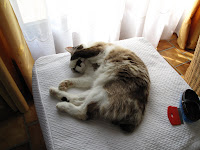

 Because the weather has been so bad recently (snow and ice) I have not been fishing for several weeks. So it was great to get out today, and spend a few hours on the river. This time of the season between Christmas and New Year is synonymous with Pike fishing, and I still have my spinning head on. However the weather was so changed from just a week ago.
Because the weather has been so bad recently (snow and ice) I have not been fishing for several weeks. So it was great to get out today, and spend a few hours on the river. This time of the season between Christmas and New Year is synonymous with Pike fishing, and I still have my spinning head on. However the weather was so changed from just a week ago.I set off from home at around 11am to a little spot a kind friend recently introduced me to. It's a place the fishing federation stock with pike from time to time. The Charente is such a huge river it's easily capable of producing pike of massive proportions, but because of the constant killing of the small 'jacks'' it's rare to find a better fish.
By midday the sun was out, and my coat had to some off. I'd been fishing for about an hour or so it was more like spring than late December with a temperature of 16 deg. So I sat with my back to a large tree that fronted the river, and just chilled. The valley was filled with rain clouds, and bright sun between the showers, then a rainbow it was just perfect.
I past two other guy's fishing for pike during the session, both spinning. Neither had a wire trace on their lines, and this seems to be a common practice in France. I expect this is another reason for so few big fish. Many are lost to incompetence and ignorance, and many fish face a grim death with UN-barbed treble hooks caught there throats, resulting in the fish being unable to feed and dying from starvation. I don't know if it's ignorance or plan stupidity, either way education is the answer if we want bigger pike in French rivers.






























 Since the season started, its been obvious to most of us, that the Touvre trout have not all spawned. On most rivers it would not be a problem, but on this river the price the trout pay for this late loving is death.
Since the season started, its been obvious to most of us, that the Touvre trout have not all spawned. On most rivers it would not be a problem, but on this river the price the trout pay for this late loving is death.

 Last season our club did a study of the river Touvre trout growth rates, by collecting and reading trout scales. It was not a huge study, but enough to give us some answers to questions we have been asking for some time. Here are the results!
Last season our club did a study of the river Touvre trout growth rates, by collecting and reading trout scales. It was not a huge study, but enough to give us some answers to questions we have been asking for some time. Here are the results!





 If I only had a choice of 4 flies for the coming season, these would be my wet fly choice! But of cause like all fly fishers, I have a box full!!
If I only had a choice of 4 flies for the coming season, these would be my wet fly choice! But of cause like all fly fishers, I have a box full!! 




